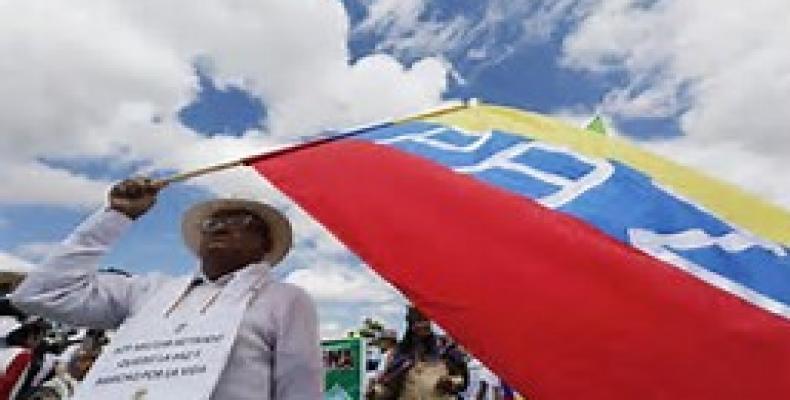Last week the Colombian President Juan Manuel Santos met with Rodrigo Londoño, the leader of FARC, the Revolutionary Armed Forces of Colombia in Havana over a peace agreement brokered by Cuba. This breakthrough comes after 51 years of insurgency and will address rights and abuses and the compensation for victims.
Now the question is, is FARC equally serious about all of this?
The short answer is yes. What's different about this particular set of negotiations from prior ones, is that FARC is in a position where they know that they have little chance of winning a military victory. They've abandoned that course of action. And so the realistic option left open to them is negotiation.
Although former President Álvaro Uribe has been vocal in his opposition to the present peace process to some degree that masks the reality that the majority of Colombian elites, including many members of Uribe's party really want this deal. Uribe himself in 2009 himself tried to contact the FARC and possibly worked for hammering out a solution.
So let's break down what's in the agreement to be negotiated over the next six months.
The agreement includes several components, four of which have at least in principle been dealt with. The first is land reform or land restitution. The second is political participation on the part of the FARC. The third is the issue of drug trafficking. And the fourth, is the question of transitional justice. So then the remaining two which need to be dealt with are essentially how to implement all of this. Because while in principle these things have agreed on, the details have yet to be ironed out. And also disarmament, FARC will have to give up its arms in order to be a party to whatever agreement is made. And then of course after all of that is done it has to be ratified by Colombian public vote.
Lets take a look at what we mean by Transitional justice?
Transitional justice means some provision for members of the FARC to be granted amnesty, and it's estimated that some 15,000 members, rank and file members of the FARC, will indeed be granted amnesty as part of the deal.
On the other hand, those who are deemed culpable for war crimes will undergo some judicial process. And essentially a separate judicial process is being set up which will involve some international legal experts in conjunction with an historical memory commission, which will seek to process the worst offenders on the part of the FARC as well as the armed forces, because they are also party to this deal. And those who admit their guilt will be given a deal which will amount to something like community service and house arrest for five to eight years. Those who don't and are nonetheless found guilty will be subject to up to 20 years in prison.
Well, you may ask, are we sure that this measure be applied to the military of the Colombian government?
That's of course the big question. And one of the members of the government negotiating team, General Mora, who is the former head of the Colombian armed forces, has been very vocal that Colombian military personnel should not suffer according to this deal. And there's certainly a lot of resistance on the part of, in middle class Colombian society, that members of the armed forces should serve jail time.
You can also say that in terms of attracting foreign investment there's no question that the signing of a deal would at least supply a kind of image boost for Colombia, which the country desperately seeks. And it's important to mention, on that score that notwithstanding all of the hoopla that the country has turned over a new leaf, Colombia remains an extremely dangerous place. And there are over 6 million people displaced in this country, second only to Syria in the world. And it's estimated that something like 150,000 people were displaced in 2014.
This conflict in many ways has been served by the civil war and on the whole Colombia will benefit, from a peace deal not only increasing tourism, and foreign direct investment, but in the possibility of redressing to some extent the social imbalance that’s part and parcel of the neoliberal model.


